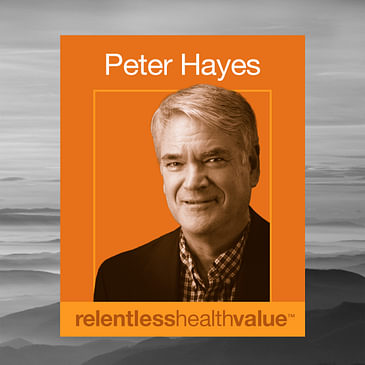For a full transcript of this episode, click here.
Here’s a quote from Ann M. Richardson, MBA. She wrote it on LinkedIn, and I love it:
Quiet the noise that doesn’t add value.
Surround yourself with intelligent and respectful people who can deliver endless opportunities.
Celebrate brilliance and new beginnings.
Together, we’ve got this.
Thanks for this beautifully stated call to action (I wish I would have written it myself) because it is also precisely the goal of Relentless Health Value and my hope for the Relentless Health Value Tribe—those of you who have connected with each other by way of this podcast vis-à-vis LinkedIn, or maybe you’ve met each other at an online or live event. For sure, subscribe to the weekly email to get notified of such goings-on.
Now, this aspirational vision doesn’t mean putting the onus on just any given individual to fix the systemic failings that get talked about on the podcast, but we can start somewhere. We can sit with ourselves; we can ask ourselves some big questions. We can decide the legacies we want to leave and what we want our life’s work to add up to. That is what this show should, I hope, help you accomplish. And, yeah … together, we’ve got this.
In this healthcare podcast, I am speaking with Peter Hayes; and we talk about five realities of 2024 for hospital chains, integrated delivery networks, health systems. Now, to make one thing very clear, as I have said many times on many Relentless Health Value shows: Not all hospital chains or hospitals are the same. There are large, consolidated, extremely rich, extremely politically and economically powerful organizations who are called health systems. And then there are rural or urban institutions that are barely scraping by and serving huge vulnerable patient populations. And despite the many aforementioned names for hospital chains and their associated outpatient facilities and owned physician groups and urgent care centers, all these names for these big care delivery entities are flabbergastingly meaningless because they do not separate the consolidated rich ones from the very desperately not rich ones.
Today on the show, we’re talking about the first kind of health systems: the big rich consolidated ones which are taking over every geography where there’s money to be made. These are the ones where you read about their bad behavior in the New York Times or hear about them in YouTube videos like this one.
Peter Hayes talks about the five things that these behemoth entities may really need to start thinking hard about, even in the face of their fierce and often-unrelenting market power and the political hold that they have over many local communities and all the regulatory capture that goes along with that.
So, here’s Peter’s list in a nutshell—the five things to get real about:
1. Health systems need to get real about the CAA (Consolidated Appropriations Act) and its implications that plan sponsors only pay “fair and reasonable” prices for medical services. Now, before I dig in on this, jargon alert: When we say plan sponsors, that means entities such as self-insured employers—sponsors of health plans, if you will (the purchasers, the ones who are actually paying the bills). Peter explains the quick version of what the Consolidated Appropriations Act is in the show that follows, so do listen. But for more info on this really, really meaningful bit of legislation that is the law as of 2021, go back and listen to the episodes with Chris Deacon (EP342 and EP408) or check out the myriad of LinkedIn posts from Jeff Hogan. Also, others like Darren Fogarty, Justin Leader, Jamie Greenleaf, and others have some great words of wisdom that you will be able to find that really explain what the point is of the CAA, the Consolidated Appropriations Act, and its sprawling implications.
2. To survive on reduced commercial reimbursements, health systems need to get real about becoming ruthlessly aggressive in driving administrative and technology efficiencies.
3. They need to get real about pivoting from fee-for-service reimbursement to episode-based care based on taking real downside risks for good clinical outcomes. They need to pivot from a mindset of maximizing patient revenue to maximizing patient health. They need to move from a sick care reimbursement model to a healthcare reimbursement model based on health.
4. They need to get real about being completely transparent and accountable in reporting how they are using the value of their tax-exempt status. Similarly, they need to account for and report how they’re using the estimated $55 billion in net margins that they’re realizing off the 340B drug program.
5. They need to get real about quality and patient safety. We still have about 46% of our hospitals that have a C or lower Leapfrog rating. And, by the way, the chance of having a fatality on an avoidable error is 90% higher at a C or lower-rated Leapfrog entity versus a Leapfrog entity that has an A or a B.
Now, some of you—and by some of you, I mean practically everybody listening—are thinking of reasons why any one of these “get real about” things is arguable or how one of the above is not holding up in some market. I think Peter would tell you the same thing that I would: You’re not wrong. But trying to predict a zeitgeist or the next pet rock never works well because it’s always a confluence of right time/right place where the whole is way more than the sum of its parts.
Think about Malcolm Gladwell’s The Tipping Point. It’s about how small changes can have enormous effects if the context is right. So, now contemplate these five things that Peter brings up. All these forces are pushing in the same direction. Put it all into a stew where 48% of Americans have delayed or forgone care due to cost. Listen to the show with Wayne Jenkins, MD (EP358) for more on that. Or, you have the article John Tozzi just wrote in Bloomberg. Here’s a quote: “In one California community, teachers have to pay an extra $10,000 a year to upgrade to insurance that covers the local hospitals. Teachers who can’t afford it … give birth outside the county.”
Meanwhile, insurers are making record profits, along with hospital CEOs and C-suites. At the same time, you know who I think is the third-biggest group with medical debt in this country? Yeah, it’s people who work in hospitals—nurses, others. There’s this frothing lack of trust for hospitals and what goes on there: 30% of physicians do not trust the leadership of their health system. And no wonder. There are examples of healthcare executives sitting up there in their palatial offices acting more like mobsters than the nuns they took over the hospital from.
So, to orient your context, you are here.
Peter Hayes is the newly retired former president and CEO at the Healthcare Purchaser Alliance of Maine. He is a national presence in healthcare strategy, innovation, and a keynote speaker.
For more on the wild-ass problems with hospital pricing, check out this list of shows. But, spoiler alert, some of these are hair-raising.
EP395: Consolidated Hospital Systems and Cunning Anticompetitive Contracts, With Brennan Bilberry
EP389: The Clapback When Hospitals Cannot Constrain Their Own Prices, With Mike Thompson
Also mentioned in this episode are Ann M. Richardson, MBA; Chris Deacon; Jeffrey Hogan; Darren Fogarty; Justin Leader; Jamie Greenleaf, AIF, CBFA, C(k)P; Wayne Jenkins, MD; John Tozzi; NASHP (National Academy for State Health Policy); Gloria Sachdev, PharmD; Chris Skisak, PhD; Leon Wisniewski; Cora Opsahl; Rik Renard; John Rodis, MD; Rob Andrews; Al Lewis; Eric Bricker, MD; Vikas Saini, MD; Judith Garber, MPP; Lown Institute; RAND Corporation; Dale Folwell; Brennan Bilberry; and Mike Thompson.
You can learn more by following Peter on LinkedIn.

Peter has also been involved in healthcare reform leadership roles on both the national and regional levels with organizations like Center for Health Innovation, Care Focused Purchasing, and Leapfrog. He’s also co-founder of the Maine Health Management Coalition and has been appointed by two different Maine Governors to serve on Health Care Reform Commissions to recommend public policies to improve the access and affordability of healthcare for Maine citizens.
08:04 Why do hospitals need to get real about the implications of the Consolidated Appropriations Act?
10:09 What is considered fair pricing for hospitals?
13:00 EP390 with Gloria Sachdev, PharmD, and Chris Skisak, PhD.
15:59 The medical transparency tool, Billy.
16:34 How does lowering prices become more challenging with consolidated hospital systems?
18:07 What is one of the solutions available to combatting this now?
19:31 Why do hospital systems need to get real about administrative and technology efficiencies?
26:51 Why do hospitals need to get real about pivoting from fee-for-service reimbursement to episode-based care?
30:53 Why do hospitals need to get real about the 340B program and their tax-exempt status?
35:38 EP394 with Vikas Saini, MD, and Judith Garber, MPP.
38:19 What are the ethical and moral issues that are coming to a head with healthcare costs?
39:03 Why do hospitals need to reexamine their care quality and patient safety?
40:05 “We just need to make sure that the health industry is as accountable as some of our other industries.”
42:53 Why does Peter think it’s going to take regulation to move the dial?
You can learn more by following Peter on LinkedIn.
@pefhayes discusses #hospitalsystems and what their executives need to do on our #healthcarepodcast. #healthcare #podcast #pharma #healthcareleadership #healthcaretransformation #healthcareinnovation
Recent past interviews:
Click a guest’s name for their latest RHV episode!
Joey Dizenhouse, Benjamin Jolley, Emily Kagan Trenchard (Encore! EP392), Cora Opsahl (Encore! EP372), Jodilyn Owen, Ge Bai, Andreas Mang, Karen Root (Encore! EP381), Mark Cuban and Ferrin Williams, Dan Mendelson (Encore! EP385)




